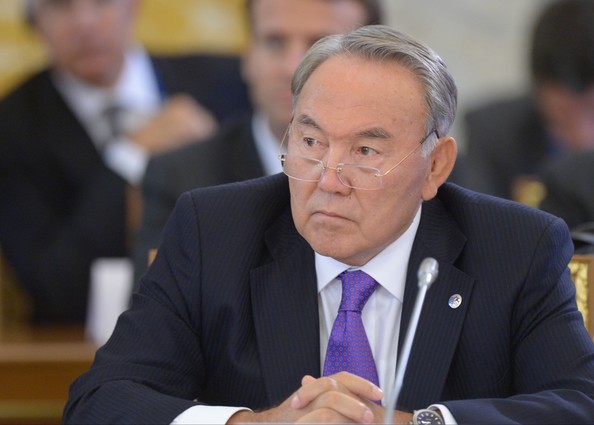
Kazakhstan Steps up Anti-Corruption Measures, but Problems Remain
Publication: Eurasia Daily Monitor Volume: 10 Issue: 214
By:

Kazakhstan plans to introduce new anti-corruption legislation and to rid the judicial system of corruption. But the country has a long way to go to move up from 133rd place in the Corruption Perceptions Index, where it was listed by Transparency International in 2012. Ranked one of the 50 most competitive economies in the world in 2013, Kazakhstan’s investment reputation is nonetheless threatened by persistent corruption. A new draft Criminal Code, submitted to the Majlis (lower house of parliament) on September 30, provides for harsher punishment for corruption, including a lifetime ban on public office for officials who have committed corruption-related crimes. Along with stripping official titles, ranks and state awards, persons convicted of corruption would also face confiscation of illegally acquired property. In addition, after revelations of the misappropriation of money in state-funded programs, the Ministry of Finance has drafted amendments to the law on public procurement to counter such fraudulent practices (Zakon.kz, October 24; Interfax-Kazakhstan, October 28).
As the new legislation is being discussed, Kazakhstan’s President Nursultan Nazarbayev reiterated in a number of statements that combating corruption is a priority for the political leadership. He urged high-ranking government officials and the ruling Nur Otan party to unmask bureaucrats involved in bribery and corruption. “The party must be a guard of civil honor for its members. People know such [dishonest] bureaucrats in local communities. This means that Nur Otan party members residing over there also know them. They must [be the] first [to] raise the alarm and unmask corrupt officials,” he said at the 15th Congress of the Nur Otan party on October 18 (Interfax-Kazakhstan, October 18).
At a meeting with “A” corps public servants, an elite group of government officials, Nazarbayev instructed them that it is the duty of public servants to eradicate corruption. He admitted that even though the government has taken some anti-corruption measures already, and although ministers, committee chairmen and deputy governors found guilty of corrupt practices have been imprisoned, the problem persists (Trend News Agency, October 17).
The new Supreme Court Chairman Kairat Mami, former speaker of the Senate, asked the chairmen of regional courts as well as regional governors to step up anti-corruption efforts in their local jurisdictions. During a videoconference with regional judges, he pointed out that the Supreme Court has received over 4,000 complaints against judges in the first nine months of the year. “Eight judges were fired, two judges were convicted and six more judges are facing corruption charges,” he said (Interfax-Kazakhstan, October 24).
Recognizing that corruption cannot be tackled without effective judicial reform, President Nazarbayev criticized fraudulent behavior in the courts at the sixth congress of Kazakhstani judges in Astana on November 20. He said that, on average, two or three judges are convicted of corruption-related crimes each year. Nazarbayev also called for measures to prevent pressure on judges, stressing that such pressure is banned by the constitution and should be investigated. Finally, he announced that the number of judges would be increased by 25 percent in 2014 to make the courts more effective (Interfax-Kazakhstan, November 20).
Although Kazakhstan has taken a number of corrective actions in recent years, the country continues to struggle with official corruption and administrative red tape. To encourage transparency, the government has undertaken rigorous scrutiny of lower- and middle-ranking officials, who are most often in contact with businesses. The State Agency for Fighting Economic and Corruption-related Crimes (the Financial Police) has adopted a new Strategic Anti-Corruption Plan 2011–2015, aiming to curb corruption at all levels. In 2011, the government initiated a new Sectorial Anti-Corruption Program 2011–2015, with the purpose to expand its anti-corruption legislation, improve business registration procedures, and to qualify Kazakhstan for membership in the Group of States Against Corruption (GRECO).
According to the Prosecutor General’s Office, the Financial Police registered 9,584 economic and financial crimes in 2012, of which 27 percent are considered serious. Charges were filed in 1,828 corruption cases with losses of 7.9 billion tenge ($52 million), of which 90 percent has been reimbursed. Senior public officials increasingly appear among those responsible.
At a conference in Astana, the deputy chairman of the Financial Police, Andrey Lukin, stated that since January 2013, his agency has uncovered a total of 264 corruption-related crimes committed during the implementation of state-funded programs such as the “Ak Bulak” program on water supplies, Business Road Map, Employment Road Map 2020, the Housing Construction Program, and the Agricultural Business programs. According to the Financial Police’s Chairman Rashid Tusupbekov, the detection of crimes involving corruption has increased by 7 percent in the first nine months of the year (Interfax-Kazakhstan, November 15; Trend News Agency, October 1).
However, results of the anti-corruption measures have been slow to materialize. One of the most sobering assessments is outlined in the draft state program on modernization of Kazakhstan’s law enforcement system, prepared by the Prosecutor General’s Office in the spring of 2013. The report admits that anti-corruption measures taken by state and law enforcement bodies have not yielded results. The authors conclude that corruption, which has penetrated all spheres of public life, “has stopped being a problem and has become systemic.”
“General and open bonding between officials and business, the involvement of relatives, friends and associates in the use of budget funds and state property are typical. Systemic corruption has two levels: the level of high-ranking officials, who are the masterminds behind the corruption system they have created and from which they get a windfall profit and the level of middle- and low-ranking officials,” the Prosecutor General’s Office program draft said (Prosecutor General’s Office, prokuror.gov.kz, March 11; Interfax-Kazakhstan, March 14).
According to the program draft, it is becoming clear that efforts to combat corruption require a comprehensive reform of law enforcement institutions to create an environment that would motivate public servants to conduct their duties honestly. And the Prosecutor General’s Office report concludes by outlining the major reforms in the law enforcement sector to be undertaken over the next several years. Unlike the economy and other sectors of public life, Kazakhstan’s law enforcement system has not undergone significant restructuring since independence.




